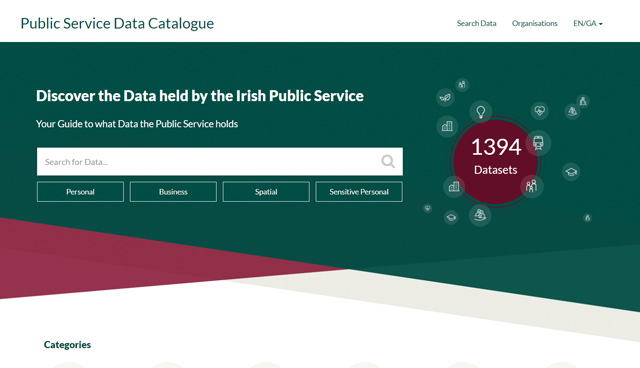Public Service Data Catalogue

In February 2021, the Government launched the Public Service Data Catalogue aimed at enhancing the transparency of public service data by publishing a list of datasets held by almost 100 public bodies.
The catalogue is a key element of the Government’s move to deliver a whole-of-government approach to how data is used and managed within the public service, included in the Public Service Data Strategy 2019-2023.
The Strategy built on the Data Sharing and Governance Act 2019, which put in place the safe and secure sharing of data across government.
One of the Strategy’s objectives is to increase the reuse of data for the benefit of citizens, businesses and policy makers. Although a simplistic concept when set out, a recognisable barrier to the reuse of data by both the public and private sector is the lack of knowledge that relevant datasets exists.
In 2017, the Economist published an article that argued that data was “the new oil” in the context of growing recognition that data collection from digital platforms was a much sought-after commodity by those designing marketing and communication strategies. Much attention for the article was focused on the power of rising data monopolies and the need for controls around personal data flows but an often overlooked element of the article was the benefits it highlighted for organisations around how new technologies and data could help organisations become better decision-makers and increase business intelligence.
In his Technical Paradigms and Digital Eras book, Giacomo Chiesa points out that while ‘data as an asset’ is a much more widely accepted concept today, “organisations, including from the public sector, often fail to govern, manage and value data in the same way as the other assets that are relevant for their success”.
This, he says, undermines the possibility of taking advantage of the opportunities brought by the “digitisation of a huge amount of information that was previously intangible”.
The OECD recognises that while data governance is increasingly relevant to data protection practices at a global scale in a more exclusive and explicit fashion, a “strong and unbalanced approach to data overprotection” can reduce the value of data sharing.
Discoverability of data and over protection of data are two distinct issues but both relate to a wider unavailability of data for better efficiencies. The Public Service Data Strategy 2019-2023 recognised that “as proliferation of public service data increases, so too does the challenge of discoverability, which determines the ability of a piece of content, information, or data to be found and accessed”.
A data catalogue, which contains information on data holdings within an organisation, is the main mechanism for making data discoverable.
The launch of the Public Service Data Catalogue in March 2021 is the outworking of a commitment within the Strategy to enable public sector bodies to list and describe their data holdings.
“It will show people what data their public service holds, why they hold that data and how it is used.”
Minister for Public Expenditure and Reform, Michael McGrath TD
The advantages of the catalogue are numerous in that it not only increases transparency for citizens, presenting a portal for the discovery of datasets and services that are available, but that it also promotes cross-government and internal public sector body data awareness and reuse.
At the time of its launch, the Public Service Data Catalogue was providing information on over 1,200 datasets across almost 100 public sector bodies. Datasets from public bodies include personal data, business data and data critical to business decisions or service delivery.
Welcoming the catalogue, the Minister for Public Expenditure and Reform, Michael McGrath TD, said: “The Catalogue is a key step in providing more data awareness and data transparency with the public. It will show people what data their public service holds, why they hold that data and how it is used.
“The catalogue contains a wide range of datasets from across the public service, all in one place. It demonstrates the benefits of joined-up Government, where public bodies work together to deliver a single unified service.”
The Public Service Data Catalogue is intended to present high-level information on key datasets across the public service. It does not list all the datasets across public service organisations.
The catalogue provides only metadata on datasets it records and does not provide direct access to the datasets it records. However, many of datasets listed are available for download via the Open Data Portal, data.gov.ie.
Minister of State for the Department of Public Expenditure and Reform, with responsibility for Public Procurement and eGovernment, Ossian Smyth TD, added: “Data plays a pivotal role in Government – it drives informed decision-making, shapes public policy and is central to the delivery of public services.
“The Public Service Data Catalogue is part of a wider programme of actions and initiatives in the Public Service Data Strategy that aim to make Ireland an exemplar in how it manages data.”





